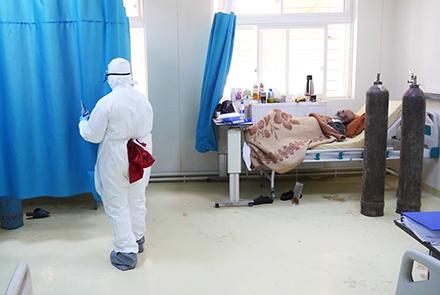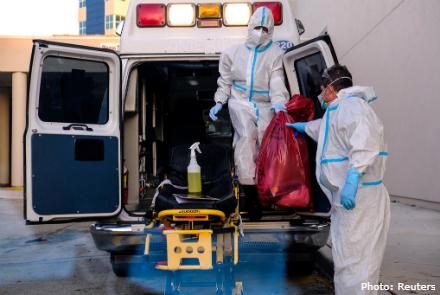Family members of COVID-19 patients on Tuesday accused the Afghan Ministry of Health of poor management of the pandemic in the country, saying that families are compelled to purchase oxygen balloons from their own money to save the lives of their patients admitted to hospitals.
Publish dateWednesday 10 June 2020 - 10:38
Story Code : 211734
This comes a few days after a number of hospitals in the country announced that they were running out of compressed oxygen for patients.
“The oxygen lasts for only five minutes, then we are asked to go to private hospitals. Even if there is oxygen at private hospitals, I must buy the oxygen for 12,000 afs from my own pocket,” said Mohammad Suhrab, a family member of a COVID-19 patient.
“The lack of oxygen is a big problem. Recently a patient died here and then my patient started losing hope. The other patient died just because of a lack of oxygen,” said Qudratullah, a family member of a COVID-19 patient.
What do sellers of compressed oxygen say?
“Yesterday we were faced with a major problem, I don’t understand how the people who keep their patients at home deal with this problem,” said Pahlawan Sattar Parsa, a seller of compressed oxygen.
“In the past, the price of one balloon of oxygen was around 6,000 afs, but now it has increased to 20,000-- there is no oxygen supply available from the companies,” said Akhtar Mohammad, who sells compressed oxygen.
“The companies are searching for big contracts, they are not supplying oxygen for shops, even private hospitals have no oxygen,” said Mohammad Ehsan, an oxygen seller.
The government is facing criticism for this problem.
“What is this government doing? The government should crackdown on corruption,” said Khalil Ahmadi, a resident in Kabul.
Meanwhile, officials at the Afghan-Japan hospital, the main COVID-19 treatment center in Kabul, have confirmed the shortage of resources in the hospital.
They said that the hospital has the capacity of admitting only 12 patients, but over 80 people come to the hospital daily.
“The intensive care unit (ICU) capacity is only for 15 people, the capacity for emergency cases is about 12, but over 80 patients come in daily, there is not sufficient oxygen,” said Mohammad Jawad Noorzai, the head of the Afghan-Japan hospital.
What does the Ministry of Health say?
“The companies have different capacities, but they have not shared the actual capacity of producing oxygen with us. The statistics which we have are not sufficient for us,” said Wahid Majroh, the deputy Minister of Health.
“The companies have major production capacity--some companies are able to produce 300 to 400 and in some cases 600 oxygen balloons daily, one of our companies is able to produce 5,000 balloons of oxygen daily,” said Rahimullah Samandar, the head of Afghan Chamber of Commerce and Industries.
Latest COVID-19 figures in Afghanistan:
The Ministry of Public Health on Tuesday reported 542 new positive cases of COVID-19 out of 1,225 samples tested in the last 24 hours.
Kabul was at the top of the list with 213 new cases, followed by Herat with 142.
Other provinces reporting cases were Paktia (22), Nangarhar (92), Ghazni (36), Logar (4), Laghman (12), Kunduz (8), Kunar (1), Kapisa (5) and Panjshir (7).
Also, 15 people were reported to have died from COVID-19 and 480 others to have recovered in the past 24 hours, according to the ministry.
The number of active cases in Afghanistan is 18,424, according to the Public Health Ministry.
The total number of known deaths from COVID-19 in the country is 384 and the total number of recoveries is 2,651, according to the ministry.
So far, 49,530 samples have been tested and the total number of positive COVID-19 cases is 21,459, data by the ministry shows.
Wahid Majroh, deputy public health minister said: "The number of infected people is more than what we announce. So far we have announced the number of positive cases that have been tested, but many people are not coming to health centers who have mild symptoms.”
"Those people who are outside their homes must wear masks," said Majroh.
The number of deaths from COVID-19 globally is more than 406,616 and the number of global coronavirus cases is 7,121,700, according to Johns Hopkins University.
“The oxygen lasts for only five minutes, then we are asked to go to private hospitals. Even if there is oxygen at private hospitals, I must buy the oxygen for 12,000 afs from my own pocket,” said Mohammad Suhrab, a family member of a COVID-19 patient.
“The lack of oxygen is a big problem. Recently a patient died here and then my patient started losing hope. The other patient died just because of a lack of oxygen,” said Qudratullah, a family member of a COVID-19 patient.
What do sellers of compressed oxygen say?
“Yesterday we were faced with a major problem, I don’t understand how the people who keep their patients at home deal with this problem,” said Pahlawan Sattar Parsa, a seller of compressed oxygen.
“In the past, the price of one balloon of oxygen was around 6,000 afs, but now it has increased to 20,000-- there is no oxygen supply available from the companies,” said Akhtar Mohammad, who sells compressed oxygen.
“The companies are searching for big contracts, they are not supplying oxygen for shops, even private hospitals have no oxygen,” said Mohammad Ehsan, an oxygen seller.
The government is facing criticism for this problem.
“What is this government doing? The government should crackdown on corruption,” said Khalil Ahmadi, a resident in Kabul.
Meanwhile, officials at the Afghan-Japan hospital, the main COVID-19 treatment center in Kabul, have confirmed the shortage of resources in the hospital.
They said that the hospital has the capacity of admitting only 12 patients, but over 80 people come to the hospital daily.
“The intensive care unit (ICU) capacity is only for 15 people, the capacity for emergency cases is about 12, but over 80 patients come in daily, there is not sufficient oxygen,” said Mohammad Jawad Noorzai, the head of the Afghan-Japan hospital.
What does the Ministry of Health say?
“The companies have different capacities, but they have not shared the actual capacity of producing oxygen with us. The statistics which we have are not sufficient for us,” said Wahid Majroh, the deputy Minister of Health.
“The companies have major production capacity--some companies are able to produce 300 to 400 and in some cases 600 oxygen balloons daily, one of our companies is able to produce 5,000 balloons of oxygen daily,” said Rahimullah Samandar, the head of Afghan Chamber of Commerce and Industries.
Latest COVID-19 figures in Afghanistan:
The Ministry of Public Health on Tuesday reported 542 new positive cases of COVID-19 out of 1,225 samples tested in the last 24 hours.
Kabul was at the top of the list with 213 new cases, followed by Herat with 142.
Other provinces reporting cases were Paktia (22), Nangarhar (92), Ghazni (36), Logar (4), Laghman (12), Kunduz (8), Kunar (1), Kapisa (5) and Panjshir (7).
Also, 15 people were reported to have died from COVID-19 and 480 others to have recovered in the past 24 hours, according to the ministry.
The number of active cases in Afghanistan is 18,424, according to the Public Health Ministry.
The total number of known deaths from COVID-19 in the country is 384 and the total number of recoveries is 2,651, according to the ministry.
So far, 49,530 samples have been tested and the total number of positive COVID-19 cases is 21,459, data by the ministry shows.
Wahid Majroh, deputy public health minister said: "The number of infected people is more than what we announce. So far we have announced the number of positive cases that have been tested, but many people are not coming to health centers who have mild symptoms.”
"Those people who are outside their homes must wear masks," said Majroh.
The number of deaths from COVID-19 globally is more than 406,616 and the number of global coronavirus cases is 7,121,700, according to Johns Hopkins University.
avapress.net/vdchxznik23nzqd.01t2.html
Tags
Top hits












